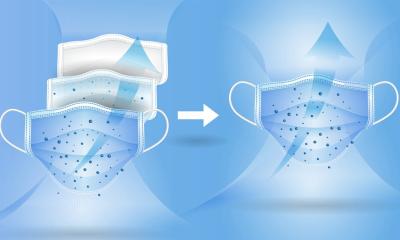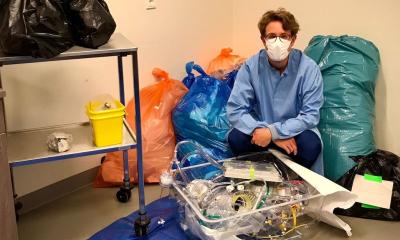Image source: Unsplash/Julia Koblitz
News • Sustainability in healthcare
Creating a circular economy for medical testing plastics
Global healthcare consumes millions of tonnes of single use plastic every year - how can the healthcare sector become more sustainable?
At present, 15 million tonnes of single-use plastic is consumed annually in the global healthcare sector, a volume roughly equivalent to half of the total plastic waste collected in the EU in 2021. However, most future strategies for healthcare provision depend on unsustainable single-use plastic products and hence, healthcare-related plastic waste is predicted to increase.1
A recent public survey in the UK revealed the public ranked medical applications of plastic as the top priority over other potential uses.2 While the NHS already has plans to reduce unnecessary plastic waste as part of ‘Delivering a Net Zero NHS’, with other healthcare systems around the world following suit, eliminating the plastic waste associated with medical testing remains a complex scientific, technical, social and economic challenge to resolve.
Recommended article

Article • Information channel
Sustainability in healthcare
The time when 'going green' in healthcare only referred to the colour of surgical gowns are long past: reducing CO₂ emissions, improving waste management and saving energy are essential for modern hospitals. Keep reading to find out what medical institutions can do to become more sustainable.
"Medical tests take place in, and beyond, formal clinical settings. The results of these tests provide essential evidence in the diagnosis and treatment of many diseases. Point of care tests (POCTs) are widely deployed across the globe for the diagnosis of diseases such as tuberculosis, malaria, and AIDS, particularly in low- and middle-income countries (LMICs)1," says Andrew Dove, Professor of Sustainable Polymer Chemistry at the University of Birmingham.
The Covid-19 pandemic, however, resulted in the mass deployment of POCTs in high-income countries (HICs) and hence highlighted the challenges of circularising the resultant plastic waste. It's not just Covid-19 POCTs that are significant, though. POCTs in high-income countries also extend to ovulation/pregnancy test kits and diabetic blood home tests. POCTs continue to contribute to a radical change in the way we deliver and engage with diagnostic medical services, which we see on a regular basis in increased virtual interactions between patients and healthcare practitioners and increasing normalisation of home testing for illness. Even though the use of Covid-19 POCTs is in decline, the threat of new pandemic viruses, ease of application as well as opportunities to extend their use suggests that there is an unmet demand for POCTs.3
The challenge is broad, but deeply necessary for our changing environment, and help us to take one more step away from a ‘throwaway’ culture towards plastics, even in medicine
Andrew Dove
Despite this need and projected growth, POCTs are not applied in a circular economy framework, leading to increased pollution from landfill or burning/incineration. Contrasting this, plastic waste generated in clinical settings is at least as significant as home testing. Despite the concentrated nature of lab-based testing, this waste is still incinerated, rather than recycled, contributing to global carbon emissions and unsustainable resource use.
Funded by UKRI EPSRC and BBSRC, Prof Dove's team will combine cutting edge, interdisciplinary science, and engineering to create innovative, sustainable circular solutions to address these medical plastic challenges; the home and clinical environments present different scientific challenges in creating circular solution.
In theory, the clinical setting could allow for very high recovery of waste plastics. The research project will seek to understand how to clean sort and reuse plastics in a manner that is more sustainable than incineration. Given the different challenges in a home setting, the project will explore public behaviour patterns, under-developed waste recovery and disposal systems interplay. Currently, in the worst case, these plastics will be released directly into the environment, at best they will be collected for recycling but not recycled. As such, a major scientific challenge is to design plastics that can be circularised but that will also be ecologically neutral if disposal is uncontrolled.
To address these challenges, the project team will take an innovative, technology-based, interdisciplinary approach to ensure that sustainable solutions are developed for each material waste stream in a way that reflects specific economic, regulatory, social, and environmental contexts, and can be sufficiently integrated into society. "The challenge is broad, but deeply necessary for our changing environment, and help us to take one more step away from a ‘throwaway’ culture towards plastics, even in medicine," Prof Dove concludes.
References:
- Ongaro et al.: Engineering a sustainable future for point-of-care diagnostics and single-use microfluidic devices; Lab on a Chip 2022
- Bespoke survey designed and carried out in partnership between University of Birmingham and YouGov Plc. Total sample size = 2942 adults. Fieldwork was under-taken between 25/03/22 – 02/04/22, carried out online. The figures have been weighted and are representative of all UK adults (aged 18+)
- Fleming et al.: The Lancet Commission on diagnostics: transforming access to diagnostics; Lancet 2021
Source: University of Birmingham
16.07.2023





